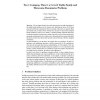Free Online Productivity Tools
i2Speak
i2Symbol
i2OCR
iTex2Img
iWeb2Print
iWeb2Shot
i2Type
iPdf2Split
iPdf2Merge
i2Bopomofo
i2Arabic
i2Style
i2Image
i2PDF
iLatex2Rtf
Sci2ools
ESA
2007
Springer
2007
Springer
Two's Company, Three's a Crowd: Stable Family and Threesome Roommates Problems
We investigate Knuth’s eleventh open question on stable matchings. In the stable family problem, sets of women, men, and dogs are given, all of whom state their preferences among the other two groups. The goal is to organize them into family units, so that no three of them have incentive to desert their assigned family members to join in a new family. A similar problem, called the threesome roommates problem, assumes that a group of persons, each with their preferences among the combinations of two others, are to be partitioned into triples. Similarly, the goal is to make sure that no three persons want to break up with their assigned roommates. Ng and Hirschberg were the first to investigate these two problems. In their formulation, each participant provides a strictly-ordered list of all combinations. They proved that under this scheme, both problems are NP-complete. Their paper reviewers pointed out that their reduction exploits inconsistent preference lists and they wonder wheth...
| Added | 07 Jun 2010 |
| Updated | 07 Jun 2010 |
| Type | Conference |
| Year | 2007 |
| Where | ESA |
| Authors | Chien-Chung Huang |
Comments (0)

